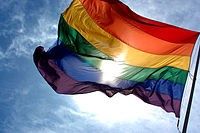Why should someone be judged by their sexuality? Why does it matter whether someone is homosexual, heterosexual or asexual? Why can’t society just allow individuals to be who they are, except that and move on?
It does not affect anyone except themselves, so the justification of judgement in the LGBT community is completely irrelevant.

October is a month of breast cancer awareness, domestic violence awareness and many other issues but the one injustice that has been in the news recently has been Lesbian Gay Bisexual Transgender History.
For 31 days in October the chance to highlight and discuss the history of those LGBT individuals have impacted the world we live in today. From Orlando Cruz, the first openly “out” professional boxer to the recognized international fashion designer, Marc Jacobs to civil rights activist and African American poet, June Jordan, each LGBT individual has help create the society we live in today.
According to Pew Research center, “92 percent [of people surveyed] say society has become more accepting of them in the past decade and an equal number expect it to grow even more accepting in the decade ahead.”
Unfortunately the reality of that acceptance has not been as prevalent as this community would like.
Two gay men were walking home after a party, when suddenly three other individuals ganged up on them and beat them up in Philadelphia. When things like this happen, it is obvious that the LGBT community has not been fully accepted into our everyday lives.
“The victims told police a group hurled gay slurs and beat them when the two parties passed on a Philadelphia street Sept. 11,” according to ABC News. “One man suffered serious facial injuries, including an orbital fracture and had his jaw wired.”
Three members of the group, Philip Williams, Kathryn Knott and Kevin Harrigan, that attacked the two men, whose identities were not disclosed, turned themselves in on Wednesday, Sept. 17 and have recently been “charged with criminal conspiracy and two counts each of aggravated and simple assault and reckless endangerment.”
Regardless of anyone’s personal opinions about the LGBT community, there should never be any issues of harassment, assault or altercations about sexuality.
Just next door, our neighboring institution, Eastern University’s President Robert Duffett, in January 2014 co-signed a letter, which seeks the right for Eastern University to discriminate against LGBT individuals.
What role does being LGBT have in a Christian university? Why should it matter? And as Cabrini students, why are we allowed have LGBT individuals on campus, but just next door, Eastern is allowed to discriminate against others?
This is the month when we should be celebrating all the good in the LGBT community, but so far, it seems as though there is still a long uphill climb for LGBT individuals to fight.
LGBT marriage rights
This week marks both the progress of the legalization of equal marriage rights as well as a reminder of the close-minded ideas that still plague our world.
Just days prior to the Oct. 6 ruling by the Supreme Court allowing same-sex marriage in five states, the Catholic University of America, located in our nation’s capital, denied the viewing of the film “Milk.” “Milk is a biological film based on the life of the first openly gay person to be elected to public office in California, Harvey Milk.
It is instances like these that showcase the drastic differences in opinions among those living mere miles from one another. On one side, supporters are working for the progression of rights for those in the LGBT community. Meanwhile on the other, there are those who are condemning the showing of a film that was meant to kick-off the beginning of LGBT history month.
To this day, such things as the practice of conversion therapy, a type of therapy that attempts to rid gay people of same-sex attraction represent the fact that citizens are obviously still uncomfortable with the thought of equal rights.
While there are people who see LGBT marriage rights as strictly either wrong or right, it’s important to understand that there is very much a grey area.
Some people believe some things should be equal, but other things not. Others believe in the equal government-granted rights as those that straight couples receive, but not calling the actual union a “marriage.”
Whether people believe it to be religiously sound or not, should not be the basis for their decision to support marriage equality. People tend to let outside ideas and propaganda influence decisions they make on social issues.
At the end of the day, the facts are that under the straight, gay, lesbian, transgender umbrella of identities, everyone is the same. Marriage is a human right and it should not be limited to those who deserve equality, by those in power who are basing decisions off of personal opinions.


